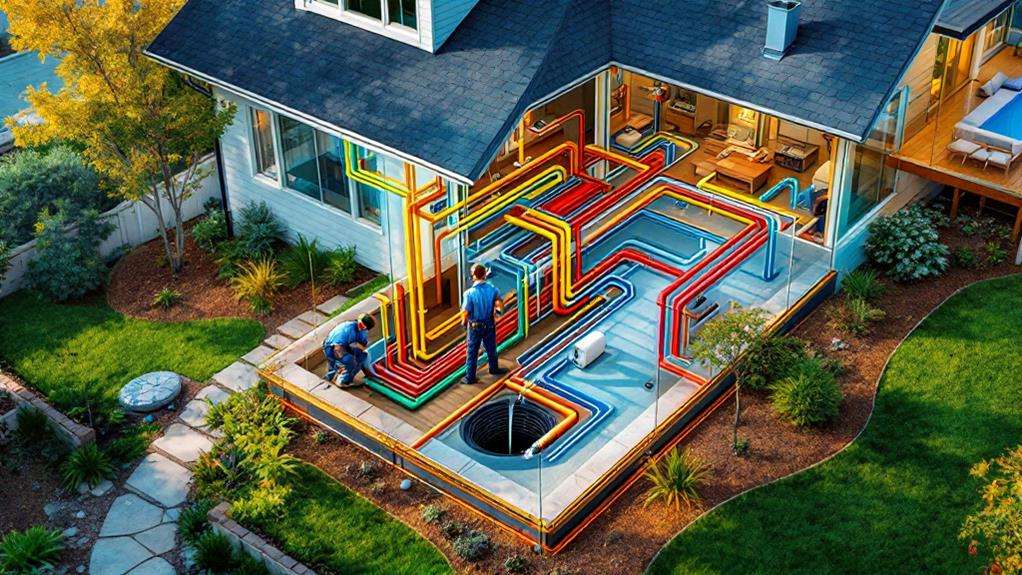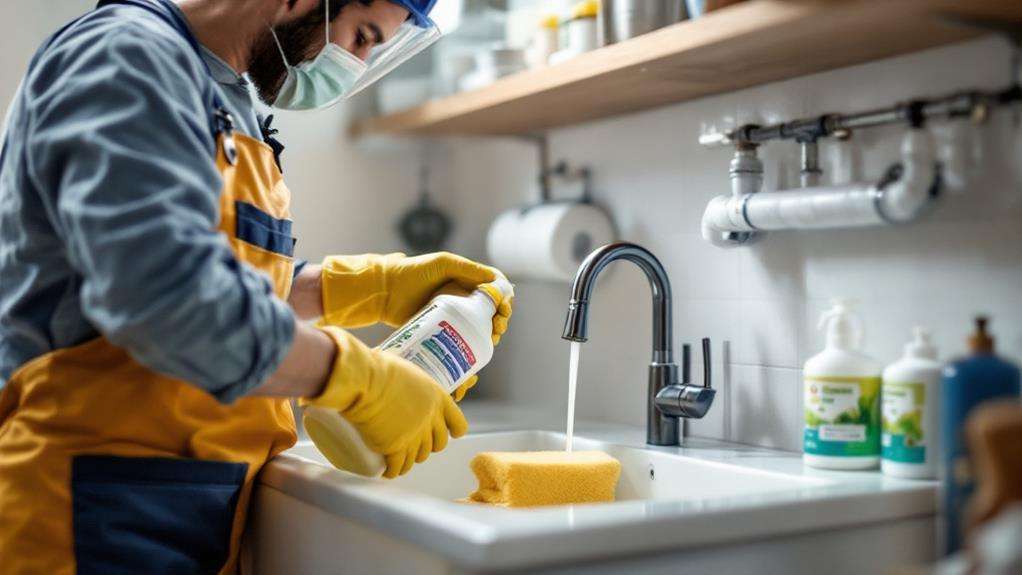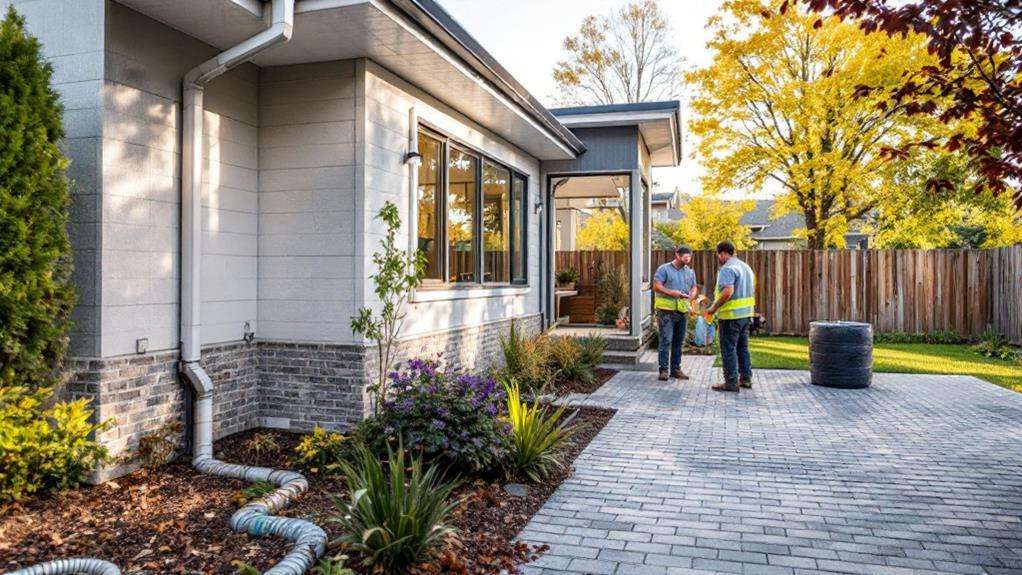How to Maintain Your Home’s Drainage System for Optimal Performance

To maintain your home's drainage system, establish a routine for regular cleaning and inspection. Clear debris from gutters, downspouts, and ground-level drains. Install drain screens to catch debris and avoid disposing of grease and fibrous foods down sinks. Address slow drainage immediately using natural methods like baking soda and vinegar. For stubborn clogs, use a plumbing snake or seek professional help. Be cautious with chemical cleaners and follow safety guidelines. Consider upgrading your system with larger pipes or additional access points if needed. By implementing these practices, you'll guarantee ideal performance and prevent costly water damage. Plunge deeper to uncover more expert tips for a well-maintained drainage system.
Regular Cleaning and Inspection
To ascertain a properly functioning home drainage system, regular cleaning and examination are essential. You'll need to establish a routine for inspecting and maintaining your drains to prevent clogs and potential water damage. Start by conducting seasonal inspections of all visible drainage components, including gutters, downspouts, and ground-level drains. Clear out any debris, leaves, or sediment that may have accumulated over time.
When cleaning your drains, use proper disposal methods to avoid introducing harmful substances into the environment. Avoid chemical drain cleaners, as they can damage pipes and pose health risks. Instead, opt for natural solutions like a mixture of baking soda and vinegar, followed by hot water. For stubborn clogs, consider using a plumbing snake or calling a professional.
Pay special attention to your kitchen and bathroom drains, as they're prone to buildup from soap, hair, and food particles. Install drain screens to catch debris before it enters the pipes. Don't forget to check outdoor drainage systems, including French drains and sump pumps, to affirm they're functioning correctly. By maintaining a regular cleaning and inspection schedule, you'll prevent major issues and extend the lifespan of your home's drainage system.
Prevent Clogs Before They Happen
A proactive approach is key to preventing clogs in your home's drainage system. To avoid debris buildup, start by installing drain screens or strainers in all your sinks, showers, and bathtubs. These simple devices catch hair, food particles, and other solids before they enter your pipes. Regularly clean these screens to maintain their effectiveness.
Be mindful of what you're putting down your drains. Avoid disposing of grease, oil, coffee grounds, or fibrous foods in your kitchen sink. In the bathroom, don't flush anything other than toilet paper. Consider using a compost bin for food scraps and a trash can for non-flushable items.
Monitor water flow in all your drains. If you notice slow drainage, address it immediately before it becomes a full-blown clog. Use natural methods like hot water, baking soda, and vinegar to clear minor blockages. For outdoor drains, keep them clear of leaves, twigs, and other debris. Trim trees and bushes near your house to reduce the amount of organic matter that can enter your drainage system.
Safe Chemical Use Guidelines

Chemical drain cleaners can be effective, but they come with safety concerns. When using these products, always follow the manufacturer's instructions carefully. Wear protective gloves and eyewear to prevent skin and eye irritation. Never mix different chemical cleaners, as this can create toxic fumes or dangerous reactions.
Use chemical cleaners sparingly and as a last resort. Overuse can damage your pipes and harm the environment. Instead, try natural alternatives like baking soda and vinegar first. If you must use chemicals, choose those specifically designed for your type of plumbing system.
Proper chemical storage is of the utmost importance for safety. Keep drain cleaners in a cool, dry place out of reach of children and pets. Ensure the containers are tightly sealed and stored away from food items. For safe chemical disposal, don't pour leftover products down the drain or into the trash. Check with your local waste management facility for proper disposal methods. Many communities offer hazardous waste collection events where you can safely dispose of unused chemicals.
Professional Drain Maintenance Services
While DIY methods can address many drainage issues, professional drain maintenance services offer a higher level of skill and equipment for tackling complex problems. These experts use advanced drain assessment strategies to identify underlying issues that may not be apparent to the untrained eye. They'll inspect your entire drainage system, including hidden pipes and connections, to detect potential problems before they escalate.
When you hire professionals, you'll benefit from their specialized tools like high-pressure water jets, video cameras, and powerful augers. These tools allow them to clear stubborn clogs, remove tree roots, and even repair damaged pipes without extensive digging. They can also implement proactive maintenance plans customized to your home's specific needs, helping you avoid future drainage emergencies.
Professional services often include thorough cleaning of your entire system, not just addressing visible clogs. This all-encompassing approach can greatly extend the lifespan of your drainage system and improve its overall efficiency. While it may seem more costly upfront, regular professional maintenance can save you money in the long run by preventing major repairs and protecting your home from water damage.
Upgrading Your Drainage System

Sometimes, even with regular maintenance, your home's drainage system may need more than just cleaning and repairs. Upgrading your drainage system can significantly improve water flow and increase capacity, ensuring better performance and longevity.
Consider installing larger pipes to handle increased water volume, especially if you've added new appliances or fixtures. Replacing old, corroded pipes with modern materials like PVC or ABS can prevent future leaks and blockages. You might also want to add more drain access points for easier maintenance and cleaning.
To enhance outdoor drainage, install French drains or dry wells to divert excess water away from your foundation. Grading your yard to slope away from your house can also prevent water from pooling near the structure. For areas prone to flooding, consider installing a sump pump system to remove excess water from your basement or crawl space.
Don't forget about your gutters and downspouts. Upgrading to seamless gutters or adding gutter guards can reduce clogs and improve water flow. Extending downspouts further away from your home's foundation can prevent water damage and soil erosion.
